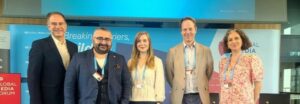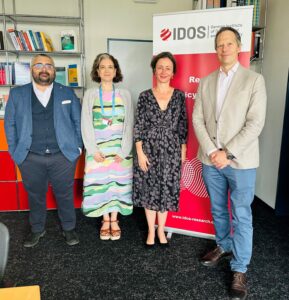Cross-sectoral collaboration for information resilience: Fighting misinformation needs more than just fact-checks. At the Deutsche Welle Global Media Forum on 7 July in Bonn, IDOS researchers and global experts argued for using alternative tools like pre-bunking and nudging, engaging trusted local actors, and forging new alliances with businesses.

IDOS researchers, Dr Semuhi Sinanoglu and Dr Anita Breuer, hosted a panel titled “Rethinking Information Resilience: Alternative Toolkit, New Alliances.” Organised by Deutsche Welle since 2008 in Bonn, the DW Global Media Forum offers an interdisciplinary platform that brings together different stakeholders from 100+ countries, featuring this year “Breaking barriers, building bridges” as a theme. The panel featured experts and practitioners from different sectors: Endy Bayuni (Meta Oversight Board & former Editor-in-Chief of the Jakarta Post) joined us with a video message, followed by an insightful discussion with Oliver Hayes (Head of Counter- Disinformation, Edelman), Caroline Sugg (Director of Strategy, Policy & Partnerships, BBC Media Action), and Sophia Becker (Project Lead, Business Council for Democracy BC4D, Gemeinnützige Hertie-Stiftung), moderated by Frank Hofmann (Senior Correspondent, Deutsche Welle).
The panel began with a keynote by Semuhi Sinanoğlu, who delivered three key messages. First, recent scholarly work suggests that there may not be broad public support for active content moderation, which could be perceived as content policing or censorship. While an overwhelming majority in democracies believe that incitements to violence should be removed and the associated accounts deplatformed, nearly half still think that free speech should be protected even when it offends others. This is why practitioners should leverage an alternative toolkit to fight information pollution, tools like pre- bunking, fact-checking, and nudging, while also working to improve public perception of these tools and build trust. At the same time, stakeholders must recognise that the effectiveness of this toolkit can be limited and may diminish over time. One-off solutions simply do not work. Sustained efforts are required, and these require funding. Given shifting geopolitics and the decreasing funds allocated to media support, businesses must be acknowledged as key partners. According to a recent estimate, fake news costs the global economy $78 billion annually. It is therefore in the interest of businesses to join the fight against information pollution. For further reading on the topic, please check out our recent policy brief on combating information pollution to protect democracy.
Following the keynote, the panel resumed with a moderated discussion between the panellists, followed by a Q&A with the audience. Here are some key takeaways from these conversations:
- Factual corrections alone do not work – context matters. In polarised settings, people knowingly share misinformation if it supports their cause. Fact-checks are often ignored or backfire when they come from untrusted sources. Lack of time and resources around sensitive times (like disasters or elections) further limits fact-checking capacity.
- Local trust and information flows matter. Efforts to counter misinformation are too often Northern-led and tech- centric. Effective interventions must engage with local, community-level information flows (e.g., “mouth-to-ear” networks), especially in low-resource settings. Because local media remains a trusted source of information and is critical for democratic resilience.
- Trust in employers is still high, which is an important resource practitioners should tap into. However, businesses may be initially reluctant to act, as they try to protect their bottom line. That is why it often takes some convincing,
- and there is an argument to be made for the benefits of stable, democratic environments for businesses. It is also in their strategic interest to protect the information space. Companies must recognise that political disruption affects morale and long-term performance, and may also have regulatory implications for businesses.
- Crisis preparedness is more effective than reaction. Companies and civil society should proactively monitor platforms, identify advocates, and have “flood defenses” (strategies and messaging) ready before misinformation hits. Response alone is insufficient.
Media literacy and critical thinking are long-term goals. Resilience is not just about verifying facts, but about building people’s ability to detect manipulation, scapegoating, and emotional appeals, not just by providing factual information but also via creative formats like dramas and entertainment content.
Next day, our panellists also had a meeting with our Director, Prof. Anna-Katharina Hornidge, at IDOS, and discussed how to foster partnerships and collaborations in a shifting geopolitical environment.


Schreibe einen Kommentar